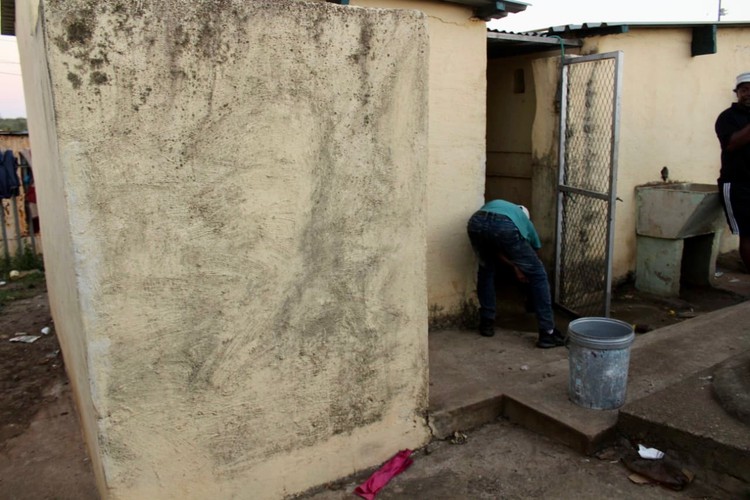Hardworking and dedicated, but these janitors in East London can go unpaid for weeks
Toilet cleaners also have to buy their own cleaning materials and chemicals and work without gloves or protective clothing
Janitors at the Cambridge informal settlement in East London, Eastern Cape, say they have to wait weeks before they get their monthly stipends. Some have had to resort to loan sharks. The toilet cleaners also say they have been working without any protective gear for years. They pay for their cleaning detergents and chemicals themselves.
They are supposed to be paid by the Buffalo City Metropolitan Municipality, as part of a public works programme. They are supposed to get paid by the end of each month. But sometimes they only get paid on the 10th or 15th of the month. When they try to contact their supervisor, he dodges their calls they say.
GroundUp spoke to three janitors who wished to stay anonymous as they feared for their jobs.
“In this job we are not allowed to complain. Once you complain they threaten to fire you. Last year July, they threatened to replace us because we were complaining about poor working conditions. New people were hired to take our jobs. We were just lucky that the community was behind us. They told them that they do not need new cleaners. But we were never paid for that month,” said one of the janitors.
Each of the four sections in the informal settlement has six toilets cleaned by two people – one male, one female. Six toilets are used by more than 200 families, three toilets for males and three for females.
One janitor said that ever since she started the job in 2010 she has been working wearing her own clothes. She said she has also always been paid the same amount of R2,400, with deductions of R100, less another R700 as a contribution for cleaning materials.
She cleans three toilets, seven days a weeks, and they can sometimes work up to 15 hours a day. The janitors are meant to open the toilets at 8am and close at 4pm. But if the toilets are locked, people relieve themselves outside the toilets, so the cleaners decided to open the toilets at 3am and close them at 11pm, and to also work on weekends.
When a toilet is blocked they find ways to unblock it themselves with wires or chemicals. If they report a blocked toilet, it will be closed and it can take months before someone is sent to fix it.
The janitor said she supports five children and also her father since he suffered a stroke. The children get child support grants, which helps, but she uses their money to buy groceries and it isn’t enough to support her family. Her father has a pension but it is used, for example, to pay to get him to hospital and for his burial society fund.
There are times when she uses her father’s pension to buy chemicals to clean the toilets while she waits for her payment from the municipality.
Her January payment came through on 10 February. Her children’s money went to their school uniforms, leaving too little money make ends meet. So she says she borrowed R500 from a loan shark. She has to pay back R750 this month: the full loan plus 50% interest. “Here I am still waiting for my money and I don’t know when I am going to get it,” she said.
A male janitor was working in his own clothes without gloves or a mask. He also said had run out of money because he had to pay a loan shark. He said that even after 11pm residents come to his house demanding the toilet keys. “We are living with elderly people in shacks, and I cannot expect them to relieve themselves in their shacks,” he said.
A third cleaner said he looks after this wife, a child and three siblings. “To be honest I work for loan sharks because not a single month goes without me borrowing money,” said the man. “There’s nothing I can do about that because we agreed as cleaners to contribute the R700 [for materials].”
He said sometimes he also has to hire tools to unblock toilets and that cost him another R150.
Ward councillor Rogers Relu (ANC) said, “I always try to put pressure on the municipality when they inform me about their payment being late, and this month is not the first time it has happened. It is very frustrating.”
Relu said he had raised the lack of working clothes and cleaning materials with the municipality. He said he was told that the materials were ordered and in the supply chain management system. “It’s been 12 months now waiting for the supply chain to provide the cleaning materials,” he said.
Questions sent a week ago to Buffalo City Metro Municipality spokesperson Bathandwa Diamond and Mayor Xolani Pakati’s spokesperson Samkelo Ngwenya have not been answered.
Support independent journalism
Donate using Payfast

© 2019 GroundUp.
This article is licensed under a Creative Commons Attribution-NoDerivatives 4.0 International License.
You may republish this article, so long as you credit the authors and GroundUp, and do not change the text. Please include a link back to the original article.

